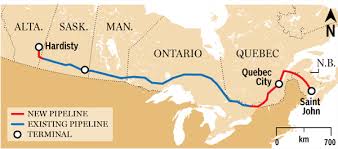TransCanada Corp. has launched a $4.5-billion lawsuit against rival Enbridge Inc. over a proposed 27-kilometre natural gas pipeline near Toronto that the companies had planned to develop.
The dispute comes amid an escalating battle between TransCanada and local gas distributors in Ontario and Quebec as they respond to a rapidly changing North American gas market, in which new extraction technology has increased U.S. production.
At stake is access to competitively-priced gas for customers in much of Ontario and Quebec. Industrial and residential end-users there are eager to take advantage of booming U.S. production and unwilling to be locked into long-term contracts for gas delivered from western Canada.
In a suit filed in Ontario court last Friday, TransCanada claims that it concluded an agreement early this year with Enbridge’s Toronto-based distribution utility to proceed jointly with a short spur that would bring more gas into the Greater Toronto Area from various sources. TransCanada said Enbridge unilaterally terminated a memorandum of understanding last month and proceeded to offer all the capacity on the proposed line – known as Segment A – to its own customers.
Claiming it would suffer “irreparable harm,” the Calgary-based pipeline company has asked the court to force Enbridge to abide by the terms of the MOU, or award it $4.5-billion in damages.
A spokesman said Monday the company would not comment because the matter is now before the courts.
Enbridge issued a statement Monday that claims the agreement was invalidated because TransCanada was not prepared to make gas from the pipeline available to all customers in the region, a contravention of provincial rules.
“The actions they took did not allow us to meet the standard of ensuring open, non-discriminatory access” as required by the Ontario Energy Board, said Guy Jarvis, president of Enbridge Gas Distribution.
In an interview Monday, Mr. Jarvis said the Segment A line is required to ensure the utility has sufficient high-pressure pipeline capacity to supply enough gas to meet growing needs in the Toronto region, and will also give it greater access to growing American supplies. He said the legal dispute is separate from the fight that Enbridge and other Ontario and Quebec customers are having with TransCanada over its main pipeline that brings western gas to central Canada.
Following a National Energy Board decision in March that limited tariff increases on the mainline, TransCanada is trying to force customers to sign 10- to 15-year contracts for service in Ontario. While the mainline is under-utilized from Alberta to Northern Ontario, service is in greater demand in the rest of the province and in Quebec.
The pipeline company also plans to convert some capacity on the mainline from gas to oil as part of its Energy East project to ship some 1.1-million barrels per day of crude from Alberta to Quebec and New Brunswick. TransCanada has said it will provide service to gas customers willing to contract long-term, but warned that costs could escalate.
“There is a change in the landscape taking place,” Mr. Jarvis said, “And our role is to represent the interests of our 2-million customers in our franchise area.”
While TransCanada aims to protect the value of its mainline system, Ontario distributors and industrial users are keen to diversify their supply base and take advantage of booming production south of the border. But they need the new pipeline capacity to do so.
“Ontario is at very pivotal point in terms of natural gas supply,” said Bruce Henning, vice-president at Fairfax, Va.-based ICF International Inc., which has produced a series of reports on the province’s gas market.
Mr. Henning said supply from the Marcellus shale fields of Pennsylvania and West Virginia, and the Utica in Ohio, will be the most economical for Ontario and Quebec. With limited access to that supply currently and high transportation costs from western Canada, Ontario is paying some of the highest gas prices in North America, he said.
“It really could become a significant cost disadvantage for gas consumers in Ontario and Quebec in terms of the rest of the market,” Mr. Henning said. “The competitiveness of industry within Ontario can be adversely affected.”
ENERGY
TransCanada, Enbridge square off over Toronto-area pipeline plan




























Laissez un commentaire Votre adresse courriel ne sera pas publiée.
Veuillez vous connecter afin de laisser un commentaire.
Aucun commentaire trouvé